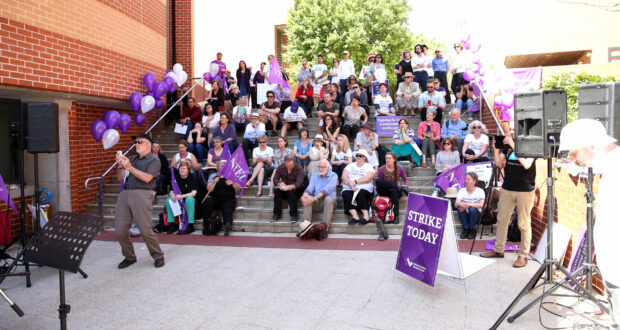Universities have underpaid their staff by at least $159m since 2009, with most of the wage loss occurring during the past 10 years, according the National Tertiary Education Union (NTEU).
In a new “wage theft” report released on Tuesday the union says 97,500 university staff suffered underpayment in 55 incidents in 32 education institutions.
Some of the biggest incidents listed are $22m repaid to casual staff at the University of Melbourne for underpayments across eight years; at least $11m in underpayments at the University of Tasmania; $10m that RMIT University agreed in 2021 that it had underpaid; $12.8m back paid at the University of Sydney; and at least $11m repaid to University of NSW to staff in a case that is still under way.
The union blames many instances of what it labels “wage theft” on wrong payments being made to casual workers because the conditions of the award were not followed.
NTEU national president Alison Barnes said the widespread casualisation of university workforces was a key factor in the wage underpayments, which had a “devastating impact on the lives of university staff”.
“It can mean struggling to make ends meet, being unable to afford to pay bills, or being forced to take on additional work,” Dr Barnes said.
“Unaccountable vice-chancellors on million-dollar salaries have been in charge of this crisis with almost no accountability.
“We need urgent action from all governments to reform the governance model for universities and protect workers from exploitation.”
While some cases of claimed underpayment are still being investigated, nearly all have been admitted by universities, which are making efforts to repay lost wages.
The NTEU said eight wage loss cases, potentially worth millions of dollars, are still underway.
The Australian Higher Education Industrial Association (AHEIA), which represents most universities on industrial issues, said the union had included historical figures in the wage underpayment total in the report, which had “increased the aggregate”.
AHEIA executive director Craig Laughton said universities had responded to the underpayments, paid back money owed and put in improved governance processes for the future.
“Universities have invested significant amounts of time and effort to identify any issues, find the people adversely impacted, and pay those people back in a timely manner,” Mr Laughton said.
Universities face further pressure from the federal government’s Universities Accord review, which found in its interim report that “large-scale wage underpayment is a clear failure of institutional governance and management, for which [university] councils are ultimately accountable”.
A university council is a university’s highest governing body.
The interim report says universities must address the staff underpayment issue “urgently”.
“Complex industrial agreements and government policy and funding arrangements had contributed to the [wage underpayment] issue, however, institutions have an obligation to ensure appropriate governance settings and frameworks to avoid these circumstances emerging,” the interim report says.
“This includes implementing updates and changes to workforce system architecture, such as payroll and time recording systems.”
Do you have an idea for a story?Email [email protected]
 Campus Review The latest in higher education news
Campus Review The latest in higher education news

